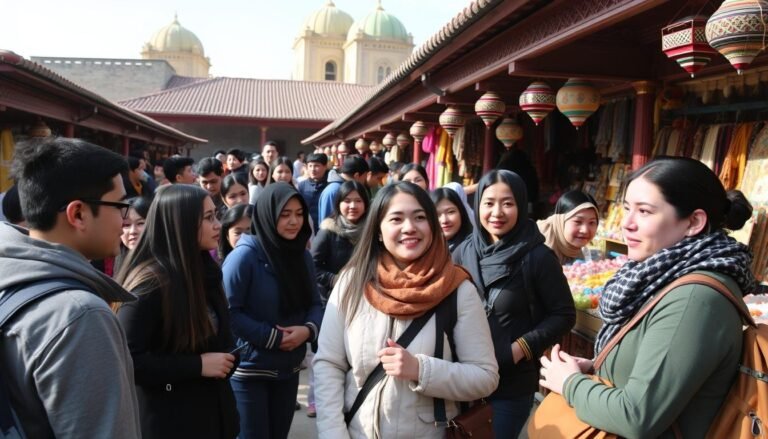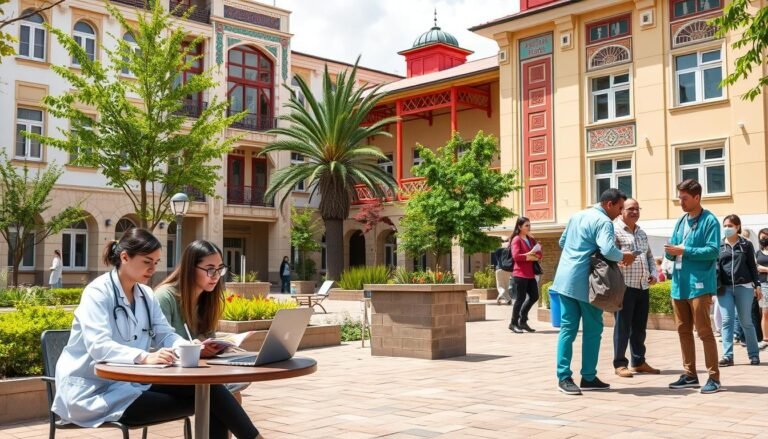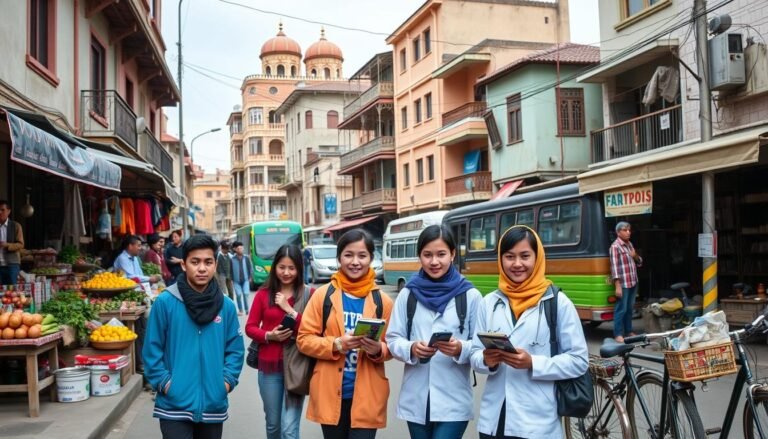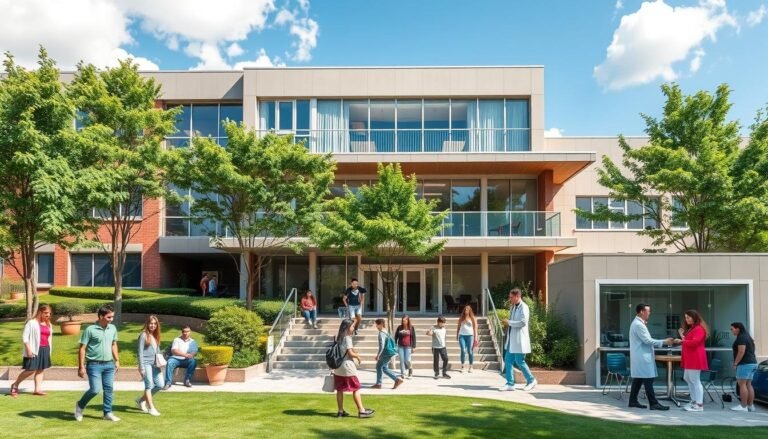Student Organizations and Clubs in Uzbek Medical Universities
Uzbekistan’s top medical universities offer a vibrant community of student organizations and clubs. These groups provide valuable opportunities for aspiring medical professionals. Let’s explore the diverse world of student clubs in Uzbek medical schools.
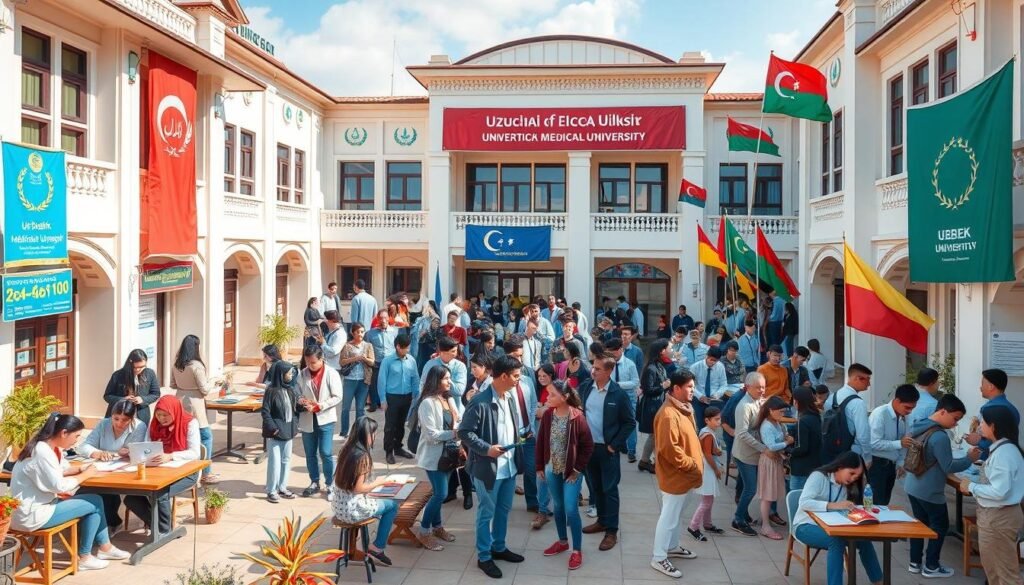
Student organizations enhance your overall educational experience in unique ways. They offer invaluable benefits that go beyond the classroom. Joining these clubs can significantly impact your journey as a future healthcare provider.
Importance of Student Organizations in Uzbek Medical Universities
Student organizations are vital for MBBS students in Uzbekistan. They foster community and enhance educational experiences. These groups offer opportunities beyond the classroom for medical students.
Uzbek student societies and uzbekistan college associations provide platforms for students to connect. They help students build a strong sense of community and share experiences.
Fostering Community and Support
These organizations host social, cultural, and recreational events. They help students navigate medical school challenges. This support system eases stress and promotes belonging.
Enhancing Educational Experiences
Student organizations complement the curriculum with workshops and seminars. They offer practical training sessions to develop essential skills. These activities enrich learning and prepare students for medical careers.
Participation in uzbekistan college associations unlocks numerous opportunities. Students can develop leadership, teamwork, and communication skills. These organizations shape the personal and professional growth of MBBS students in Uzbekistan.
Types of Student Organizations Available
Uzbek medical universities offer diverse student organizations. These cater to various interests and aspirations. They fall into two main categories: professional medical associations and cultural/recreational clubs.
Professional Medical Associations
These associations focus on specific medical areas. They provide opportunities for academic and professional growth. Students can attend workshops, seminars, and networking events.
These activities deepen knowledge and engage students with industry experts. Examples include the Internal Medicine Society, Pediatric Society, and Surgical Society.
Cultural and Recreational Clubs
Uzbek medical universities also host cultural and recreational clubs. These celebrate student diversity and promote cultural exchange. They foster a sense of community among students.
These clubs range from sports teams to music groups. They allow students to explore passions beyond academics. Popular examples include Tennis Club, Chess Club, and Anime Club.
Other options are Dance and Music Club, Charity Club, and Women Empowerment Union. These offer varied experiences for students.
Engaging in uzbek youth organizations and uzbek youth initiatives broadens horizons. It develops leadership and collaboration skills. Students create lasting memories and connections, enriching their university experience.
Key Roles of Student Organizations
Student organizations in Uzbek medical universities shape members’ academic and social experiences. They offer leadership opportunities through elected positions like President and Treasurer. These roles help students develop management and organizational skills for future careers.
Leadership Development Opportunities
Leadership roles in student organizations help Uzbek medical students improve communication and problem-solving skills. These experiences boost personal growth and prepare them for leadership in their communities. Students become better equipped to influence the medical field positively.
Networking and Career Advancement
Uzbekistan’s medical university student organizations host networking events and career fairs. These gatherings connect students with medical industry professionals. Students can explore career paths and build valuable connections for future job searches.
These groups bridge the gap between students and university leadership. They address student concerns effectively. Members advocate for their peers, improving the overall academic environment.
How to Join a Student Organization
Joining a student organization in Uzbekistan’s medical universities can be an enriching experience. It’s a great way to expand your network, gain leadership skills, and explore your interests. Getting involved on campus offers numerous benefits for Uzbek graduate students.
Membership Process and Requirements
Start by attending campus-wide club fairs to learn about various organizations. These events allow you to discover groups that match your passions and goals. It’s an excellent opportunity to meet current members and ask questions.
Review each organization’s specific guidelines and requirements. Some may have GPA requirements, membership fees, or mandatory introductory meetings. Make sure you meet the necessary criteria before applying.
Tips for Selecting the Right Organization
- Consider your academic interests, career aspirations, and personal hobbies when exploring different organizations.
- Attend informational meetings or events to get a feel for the organization’s culture and activities.
- Seek organizations that offer opportunities for leadership development, networking, and hands-on experiences.
- Evaluate the time commitment required and ensure it aligns with your academic responsibilities.
- Seek out organizations that have a strong track record of engaging members and making a positive impact on the campus community.
Take time to carefully consider your options when choosing an organization. Select one that aligns with your interests and goals. This approach can unlock numerous personal and professional growth opportunities for Uzbek graduate students.
| Statistic | Value |
|---|---|
| The Young Professional Internships Program (YPIP) in Uzbekistan focuses on | undergraduate business and STEM majors |
| YPIP provides | summer internships at small and medium-sized businesses in Uzbekistan |
| YPIP offers | a built-in support system of business mentors for the interns |
| The selection process for the YPIP program includes | an online application and interviews with representatives of American Councils and potential host organizations |
| Only full-time undergraduate students at host universities are eligible to participate in the YPIP program | true |
| Finalist interns receive | a modest stipend to support their travel and living costs in Tashkent, Uzbekistan |
| Applicants are required to have | a commitment to a career in business or STEM fields, be proficient in English, be citizens of Uzbekistan, and have current residency in Uzbekistan |
| Michigan State University (MSU) has | over 700 registered student organizations |
| The Eurasian region covered by the Eurasian Student Association encompasses | 15 former Soviet countries with a total population of over 245 million |
| The Italian Club at MSU was re-established | in 2011 |
Impact of Student Organizations on Personal Growth
Uzbekistan’s medical universities have vibrant student organizations. These groups help members grow personally. Students develop leadership skills and teamwork abilities through participation.
Building Leadership Skills
Leadership roles in student groups sharpen management and decision-making skills. Students organize events, manage budgets, and represent their peers. These experiences build confidence and problem-solving abilities.
Students gain public speaking skills through these activities. This prepares them for future roles in medicine.
Cultivating Teamwork and Collaboration
Student organizations promote teamwork and collaboration. Group projects and community service teach effective cooperation. Members learn to communicate openly and use their peers’ diverse talents.
These experiences mirror healthcare’s multidisciplinary nature. Students prepare for teamwork challenges and rewards in their future careers.
The impact of student groups extends beyond university. Leadership and interpersonal skills provide a strong foundation. These abilities empower Uzbek medical students in their future careers.
Graduates can make meaningful differences in patients’ lives. They also positively impact their communities with these skills.
Prominent Student Organizations in Uzbekistan
Uzbekistan’s medical universities boast thriving student organizations. These groups shape the experiences of future healthcare professionals. The Uzbekistan Medical Student Association (UMSA) and Women in Medicine Initiative stand out as key players.
Uzbekistan Medical Student Association (UMSA)
UMSA represents medical students nationwide. It organizes conferences, research opportunities, and international exchange programs. The association fosters networking and professional growth for its members.
UMSA collaborates with university leaders and healthcare professionals. They advocate for the interests and well-being of Uzbek medical students.
Women in Medicine Initiative
This student-led organization empowers female medical students. It addresses gender-specific challenges in the medical field. The initiative offers workshops, mentorship programs, and advocacy campaigns.
Their goal is to support women’s participation in medicine. They aim to inspire the next generation of female healthcare providers in Uzbekistan.
Uzbekistan’s medical universities host various professional clubs and student associations. These cater to diverse interests and needs. They foster a vibrant campus community and promote student growth.
Organizing Events and Activities
Student organizations at Uzbek medical universities organize diverse events and activities. These initiatives enhance educational experiences and foster community engagement. Uzbek youth organizations and uzbek youth initiatives play a crucial role in campus life.
Workshops and Seminars
Student groups host educational workshops and seminars on medical topics. These events help students expand knowledge and develop new skills. Workshops cover research methods, clinical skills, and healthcare entrepreneurship.
Social Gatherings and Networking Events
Student organizations also plan social events and networking opportunities. These activities build community and camaraderie among students. Examples include welcome parties, cultural celebrations, and career fairs.
Students connect with peers and professionals in the medical field. They can explore potential career paths through these events.
Notable events include the Clubs Fair and Spirit Week. These showcase student activities and celebrate university traditions. Many events involve fundraising for charitable causes.
Uzbek medical students develop leadership and communication skills through these activities. They gain hands-on experience that prepares them for the medical field. These opportunities contribute to their holistic development as future healthcare professionals.
Funding and Resources for Student Organizations
Uzbek medical universities support student organizations with various resources. They provide budgets, campus facilities, and grants for student-led initiatives. This support helps create a vibrant student life ecosystem.
University Support and Grants
Universities allocate budgets for student organizations to organize events and workshops. These funds cover expenses, speaker fees, and necessary materials.
Some universities offer grant programs for student groups. These grants fund innovative ideas and initiatives proposed by students.
Fundraising Strategies
Student organizations in Uzbekistan also engage in their own fundraising efforts. They organize charity events, seek sponsorships, and collect membership fees from uzbekistan undergraduate groups and uzbek student unions.
Self-generated funds allow organizations to expand their reach. They can implement ambitious projects that cater to diverse interests of the medical student community.
| Funding Source | Description | Application Deadline |
|---|---|---|
| University Grants | Allocated budgets and funding opportunities for student-led initiatives | Varies by institution |
| External Grants | Competitive grants from non-profit organizations and government agencies | Ranges from monthly to annual |
| Fundraising Events | Charity events, sponsorships, and membership fees | Organized by student groups as needed |
Uzbekistan undergraduate groups and uzbek student unions use university support and creative fundraising strategies. This helps them secure resources for impactful events and enriching projects.
Challenges Faced by Student Organizations
Uzbek graduate student bodies and campus groups face many challenges. They struggle to create lively and impactful organizations. Two main hurdles are balancing academics with club activities and keeping members engaged.
Balancing Academics and Participation
Medical education in Uzbekistan is tough. Students find it hard to manage coursework while joining clubs. Exams and clinical rotations leave little time for extracurricular activities.
This makes it difficult for students to be active in organizations. They must choose between studies and club participation.
Maintaining Engagement and Interest
Keeping members interested is an ongoing struggle. This is especially true during busy academic times. Organizations must handle admin tasks, budgets, and leadership changes.
Sustaining enthusiasm can be challenging. Students graduate or move to clinical placements. This affects the group’s momentum.
Uzbek student bodies remain committed to growth opportunities. They face challenges head-on. By building supportive communities, these organizations can thrive.
Their impact on campuses and the medical field continues. They provide valuable chances for personal and professional development.
| Challenge | Impact | Potential Solutions |
|---|---|---|
| Balancing Academics and Participation | Difficulty for students to actively engage in student organizations while meeting rigorous academic demands |
|
| Maintaining Engagement and Interest | Sustaining consistent participation and enthusiasm among members, especially during busy academic periods |
|
Future of Student Organizations in Uzbek Medical Universities
Student organizations in Uzbek medical universities are set for exciting changes. Technology will reshape how students engage and collaborate. New opportunities are emerging in this digital era.
These changes will enhance student experiences and prepare them for future challenges. Innovation will drive growth in medical education and research.
Trends and Innovations
Digitalization will transform student organizations. Virtual platforms will connect members across distances. They’ll enable easy communication, planning, and knowledge-sharing.
Web-based seminars and online mentoring will become more common. Interactive digital communities will foster global networking. These tools will encourage collaboration across different fields.
Vision for Upcoming Generations
Future Uzbek medical students will be empowered leaders. They’ll drive research and build international partnerships. Their projects will address global health issues.
These students will advance medicine and improve society. They’ll embrace innovation and social responsibility. Their global perspective will help them make a lasting impact.
